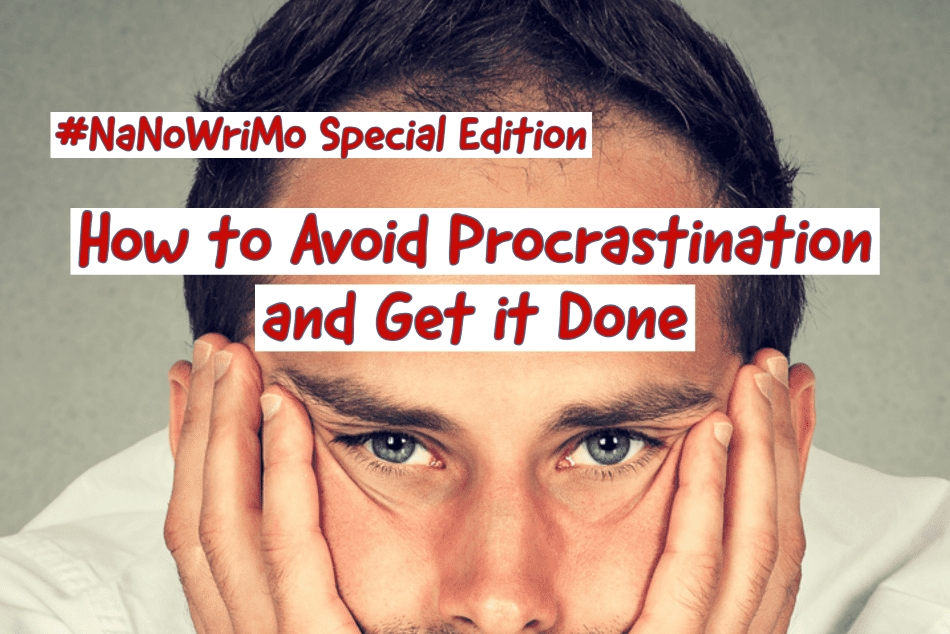Mark Twain was a funny guy. “Do not put off till tomorrow what can be put off till day-after-tomorrow just as well,” he said. But that’s a joke, not actual advice. After all, Twain was the author of twenty-eight books in addition to numerous short stories, essays, etc. That guy was not doing a lot of procrastinating.
What is procrastination? It’s the action—some might say the art—of delaying something, despite knowing that there will be negative consequences for doing so.
Writers are creative souls who can come up with any number of ways to avoid getting words on the page. A friend of mine once spent two-hours making home-made cat food instead of working on her book. I don’t know what’s more heart-breaking—that the scene didn’t get written or that the cats didn’t eat the food.
Perhaps everyone procrastinates a bit. That’s okay. Taking time to clean-up your computer desktop or make a strong cup of coffee may ease you into your work. No harm there. But too much procrastination can lead to frustration with yourself and your process. It can also lead to lost opportunities. Says author Christopher Parker, “Procrastination is like a credit card: it’s a lot of fun until you get the bill.”
Also, dear author, taking a sensible break doesn’t count as procrastination, Sometimes you need to walk away from your desk to charge your batteries or problem-solve. Many writers get their best ideas doing laundry or washing dishes, so give yourself a break—a short one before getting back to work.
“As a writer, I need an enormous amount of time alone. Writing is ninety percent procrastination: reading magazines, eating cereal out of the box, watching infomercials. It’s a matter of doing everything you can to avoid writing, until it is about four in the morning and you reach the point where you have to write. Having anybody watching that or attempting to share it with me would be grisly.” -Paul Rudnick
“I’ll think about it tomorrow…”
You know when you’re procrastinating. But do you know why?
Do you imagine you’ll have more time tomorrow? Beware, as soon enough, as the saying goes, “Tomorrow is going to be the busiest day of the week.”
Fear of failure may also prevent a writer from diving into a project. Face and conquer that sabotaging fear. It’s irrational, for the only surefire way to fail is not to try. Don’t overthink it. Jump right in with both feet. Or both hands.
“The dread of doing a task uses up more time and energy than doing the task itself.” –Rita Emmett, The Procrastinator’s Handbook
We may also be scared of the content. Writing about sensitive subjects can be intimidating, even triggering. Writing is exploration, after all. And no matter what the subject, each of us is mining the emotional territory of our lives. Freud studied literature for a reason: whether it is designed to or not, writing reveals or uncovers our inner selves. Sounds scary, but the process may prove cathartic.
Just get it down
You won’t finish that first draft if you don’t start. In my experience, most procrastination occurs at the beginning of the project when that black screen is just too intimidating. But work undone or pages unwritten loom larger than they actually are. And the longer they are put off, the bigger the hurdle.
Don’t wait for things to be perfect. Perfect is the enemy of good—and at this point, it doesn’t even have to be good.
Get going. Write without looking back and finish a first draft. Get it done. Assume your first draft is going to be bad. You can and will revise later.
Help is available
If it’s November, that means it’s NaNoWriMo time—meaning the incredible national program for participating authors to write 50,000 words of a novel in one month. That sounds daunting but sometimes community support and a firm deadline is just the kick in the butt a writer needs to reach their word-count goals. Check out their website for specifics on that or other programs.
Another procrastination-busting approach is The Pomodoro Method, a time management technique employing focused work sessions. Using a timer while working may promote sustained concentration while avoiding mental fatigue.
You won’t get much done if you only write when you feel like it. If you want to be a writer, write on.
Do you have any procrastination-busting secrets? Share with us on Facebook.





